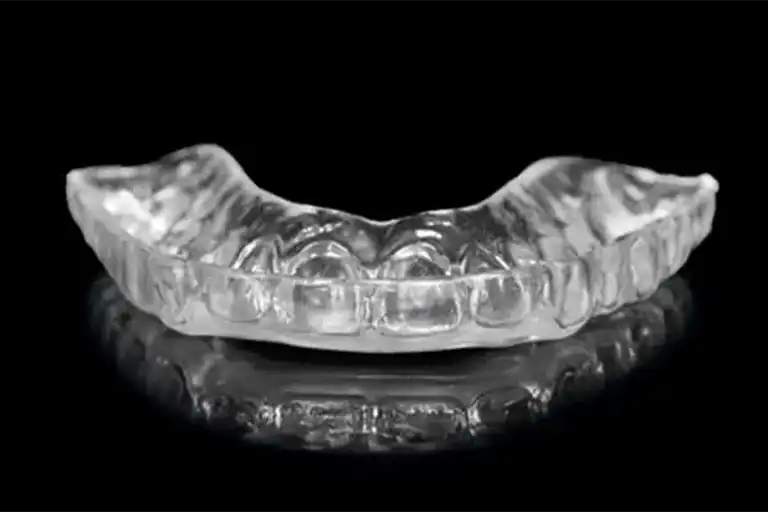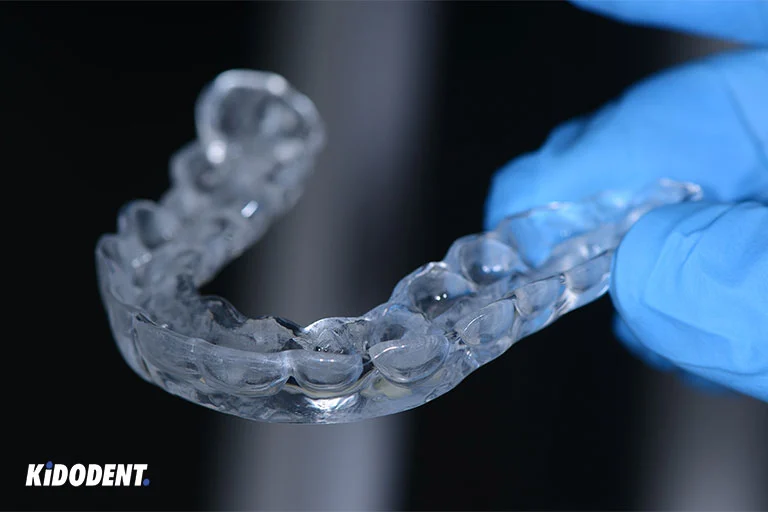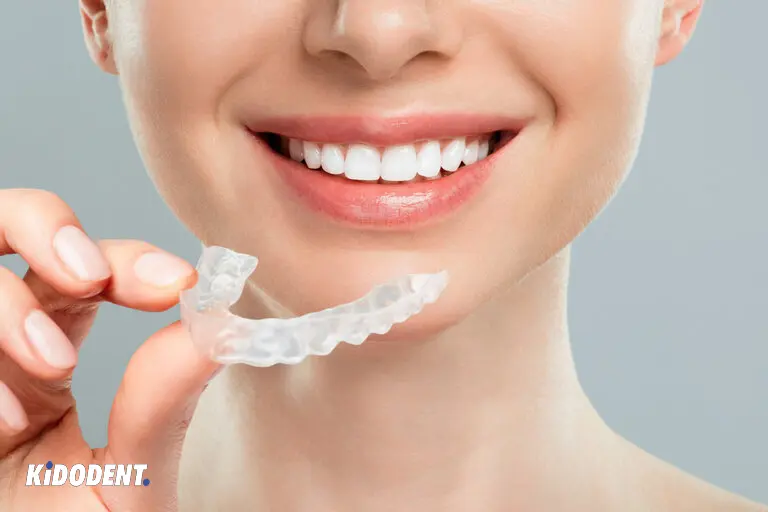Mouthguards help protect your teeth from grinding or clenching during sleep, the condition known as bruxism. They help reduce sleep-related conditions like snoring and sleep apnea. They are also widely used devices to protect the mouth and teeth while playing sports. You can get your mouthguard at a local drugstore or custom-made by a dentist.
Why do you need a mouthguard?
Mouthguards, also called night guard, are dental appliances that are worn over your teeth to protect teeth, gums, cheeks, jaw, and mouth against injuries and trauma. Children as well as adults can benefit from them. Made of soft materials, a mouthguard can absorb the force of the damage and reduce or prevent the impact of traumatic injuries altogether.
Dentists recommend mouthguards for a number of reasons. Your dentist will likely ask your child or you to wear a mouthguard in the following situations:
- Having bruxism—grinding and clenching your teeth
- When playing high contact sports like boxing, rugby, football, basketball, or hockey.
- To decrease the risk of dental trauma in case of a fall, accident, or having something thrown at you or your child’s face during skateboarding, mountain biking, gymnastics
- Snoring
- TMJ disorders and other facial or jaw muscle pain
- Obstructive sleep apnea
What are the different types of mouthguards?
Although mouthguards have the same function: to protect the face and mouth specifically teeth from damage, their construction and fit is key in doing the protection well. The higher the quality and better the fit of your mouthguard, the more comfortable they are in your mouth and better to prevent injuries.
Right now, there are three main types of mouthguards on the market:
Stock mouthguards
A stock mouthguard is the cheapest option and can be bought over the counter from any sporting goods store or drugstore. Although they come in small, medium, and large sizes options, these mouthguards cannot be molded to your mouth.
Therefore, their main disadvantages are they don’t offer a comfortable fit, making it a poorly fitted type of mouthguard which makes it difficult to talk or breathe. Because of their one-size-fits-all, stock mouthguards feel bulky and they are best for occasional use.

Boil-and-bite mouthguards
Another store-bought guard, boil-and-bite mouthguards are relatively inexpensive and are easily available at drugstores. These moldable dental guards, as their name suggests, come with an impression kit. They allow you to place the mouthguard into boiling water and then take an impression by biting into it to mold it according to your teeth and bite.
Although they customize to fit your teeth and provide a better fit than stock ones, boil-and-bite still are not as effective and strong as professionally custom-fitted ones made by your dentist.
Custom-made mouthguards
You can get a custom-made mouthguard, which are specially designed according to your individual needs at a dentist’s office. First, your dentist will take an impression of your teeth and gums and use it to create a mouthguard personalized to your bite to fit your teeth.
They offer the best protection and the most comfortable fit. Due to the professional work and special material involved in the fabrication of the custom mouthguards, they are strongly recommended by dentists and health professionals.
So, if you grind your teeth, have sleep apnea, snore, or participate in any sports activity, custom-made mouthguards are the best options for you.
Why are mouthguards important: What type should I use?
Mouthguards are crucial dental devices with different functions. While you can find different types, it is important to wear them when necessary and choose the right type based on your condition.
Sports
One study has found the importance of mouthguard use to contribute significantly to lower the risk of dental trauma. Therefore, athletes of all ages who are especially involved in sports activity with a high risk of injuries are recommended to protect their teeth, cheeks, jaw, and lips with a mouthguard.
American Dental Association (ADA) has recommended wearing a mouthguard that is properly fitted to reduce oral injuries while doing sports and recreational activities, especially in sports with a higher risk of dental and orofacial injury.
ADA also provides a list of sports and activities which need mouthguard—including high contact/collision and limited contact sports. Here are some of them:
- Boxing
- Basketball
- Combat sports
- Rugby
- Martial arts
- Football
- Hockey (Ice and Field)
- Wrestling
- Acrobatics
- Skiing
- Baseball
- Bicycling
- Inline Skating
- Surfing
Teeth grinding
Bruxism, or teeth grinding, is a sleep-related movement of grinding or clenching teeth. The condition often occurs during sleep, sleep bruxism, but some people may grind their teeth or clench their jaw while awake.
Wearing a mouthguard helps prevent teeth grinding from causing damage. It creates a protective layer against the top and bottom teeth and thus prevents the griding force of bruxism from chipping or breaking your teeth. You will also keep your gums, jaw muscles, lips, and inside of your cheeks safe from teeth grinding sores and pain.
Talk to your dentist about getting a custom-fitted mouthguard and how you can treat your teeth grinding habit. A custom-made mouthguard is the best option in this sense.

Compared to boil-and-bite and stock type, you will be better off with custom one because you will need to wear the guard the entire night while you are sleeping. So, it should fit your teeth, be comfortable, and resist durably against the grinding pressure in the long run.
Obstructive sleep apnea
In obstructive sleep apnea (OSA), a person’s airway collapses partially or completely during sleep which leads to the breathing to stop, choking, lower oxygen level, snoring, and sleep disturbance.
Wearing a mouthguard is an effective and common treatment option for obstructive sleep apnea. What the sleep apnea mouthguards do is move the lower jaw or the tongue forward and open up the person’s airway. These oral appliances reduce the number of pauses in breathing (apnea) and improve your blood oxygen levels. They help decrease the frequency of snoring and keep daytime sleepiness away the next day.
Also, do remember that mouthguards which are designed to treat obstructive sleep apnea are different from those over-the-counter types made to prevent teeth grinding or snoring. Therefore, it is important to talk to your healthcare provider or dentist about getting your custom-fitted mouthguard that is designed for sleep apnea.
How to care for your mouthguard?
It is important to practice good oral hygiene and clean your mouthguard before putting it in your mouth. Also, avoid anything that could damage or warp your mouthguard to make sure it still fits properly and performs as best.
Here are some basic tips on how to take care of your mouthguard to get the most out of them:
- Brush your teeth and floss before putting in the mouthguard/night guard
- Rinse your mouthguard with cool water and clean it with toothbrush and toothpaste before wearing or taking it out to remove plaque and food particles thoroughly.
- Avoid hot water or placing it directly in hot sunlight which could warp its shape.
- Store it in a hard, ventilated container to keep it safe from damage when traveling to sports activity or to allow it to dry out.
- Check for signs of holes or damage frequently
- Bring it to your dentist to make sure it works properly and fits on your teeth. If you have the over-the-counter type, talk to a dentist about that.
- Even in a container, keep it out of reach of pets.
- Replace the guard according to your dentist’s instructions or by noticing any sign of wear or holes.
